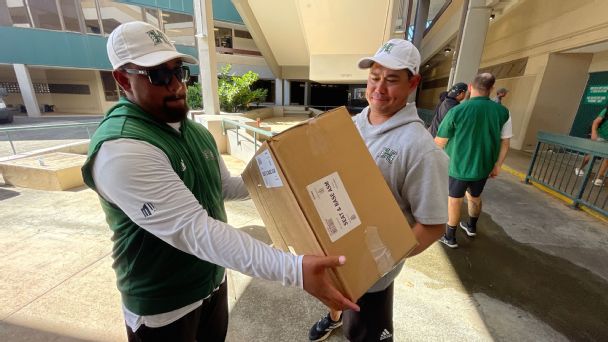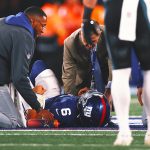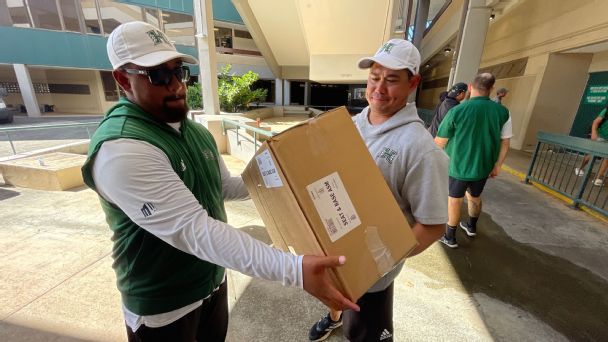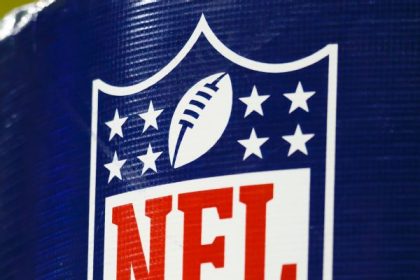
In the middle of the night of Monday, Aug. 7, Hawai’i football coach Timmy Chang woke to the sound of loud noises. His wife, Sherry, was already awake and asked, “Do you hear the wind?” Chang didn’t know it at the time, but a high-pressure system north of Hawai’i and Category 4 Hurricane Dora — about 800 miles to the south — led to the unusually powerful winds across the islands.
“It sounded like it was banging on the house,” Chang said. “It was really, really strong. The first thing I thought was, ‘Wow, tomorrow’s gonna be interesting trying to throw the ball in this wind.'”
The next day started like any other Tuesday in training camp. Hawai’i got through its morning practice, and by about 4 p.m. was getting into meetings before dinner and evening walkthroughs. That’s about when word started circulating around the team’s Manoa, Oahu, facility that wildfires had broken out on Maui, about 80 miles away.
Chang’s first thought was the wind. Wildfires are common in Hawai’i — especially this time of year — but the high winds meant the fire would travel quickly.
It was a precursor to the deadliest American wildfire in over 100 years.
At about 6 p.m., reports of devastation were almost incomprehensible.
“That’s when we heard, ‘Front Street does not exist,'” said Chang, referring to the main road through Lahaina Town’s historic bustling downtown. “Then you start to hear reports about people jumping into the ocean to save their lives, to get away from the fire.”
In the three weeks since, the death toll has risen to 115, with a list of unaccounted for individuals of more than double that. The town was left in ruins. Roughly half Lahaina’s 12,000 residents were displaced, according to Hawai’i Gov. Josh Green. There is no estimate for how long it will take to rebuild.
When Hawai’i steps on the field Friday for its home opener against Stanford (11 p.m., ET on CBSSN), it will be with heavy hearts — a moment of silence will be held before kickoff. There’s a sense of state pride that always comes with playing for the Rainbow Warriors, but in the wake of the fires, there’s an added feeling of responsibility to represent resiliency.
Receiver Karsyn Pupunu was born and raised in Lahaina and, along with defensive back Kimo Holo Holt-Mossman, is one of two Maui natives on the team. They shared updates with each other throughout the day the fires broke out, but as the fire intensified cell service went out in West Maui and updates became scarce.
The next day delivered heartbreaking news for Pupunu: an aunt, uncle and two of his cousins were among those who died in the blaze.
“That really messed me up,” Pupunu told ESPN. “That’s when I decided it was time to go home for a little bit.”
His family home, located up the road a few miles in Kahana, was spared, but that didn’t serve as much consolation.
“He needed to be there with his family members and join in the effort to help and see what’s going on firsthand,” Chang said. “Then come back when he’s ready — and that’s what happened.”
Holt-Mossman is from the east side of Maui in Kula, about a 45-minute drive from Lahaina, but several of his family members, including his elderly grandmother, were forced to evacuate as fires broke out in different parts of the island.
Through the uncertainty of it all, Pupunu and Holt-Mossman said they received incredible support from teammates, coaches and those around the program, but the wider response efforts have also stood out.
“The support has been huge,” Pupunu said. “Not only the people from Hawai’i, but even the people from the mainland. Everyone’s been showing their love, support and care throughout this whole time and just making sure that we’re all good. Whether it’s us, our family members, or even people in Lahaina that they may not even know, but they’re still trying to support.”
Stanford will wear Maui decals on its helmets for Friday’s game. Vanderbilt, Hawai’i’s opponent last week in its season opener, announced partial proceeds from ticket sales to the game would be donated to the Hawaii Community Foundation and the Maui Strong Fund. UCLA announced last week it would provide complimentary football tickets to games against Coastal Carolina and North Carolina Central to anyone who donated at least $10 to one of four charitable funds supporting relief efforts. Two exhibition men’s college basketball games — Tennessee at Michigan State and Saint Mary’s at Hawai’i — have also been scheduled for October to raise money.
The Hawai’i football program’s response was almost immediate.
Within 48 hours, it initiated a Maui relief drive and gathered non-perishable goods as part of a previously scheduled fan fest event. During the season, coaches and players are somewhat limited in how they can help, but Chang said when the season is over they plan on having a presence in Maui to assist in whatever way they can.
“We’ll be out in Maui, boots on the ground trying to figure out how we can help,” he said. “And if it’s us just playing football with the kids, then we’ll do that. But me and my staff will be out there and if we can bring players, we’ll bring players.
“We want to help. And whether that’s with a shovel to help rebuild or that’s with football, we’ll be there.”
Chang even threw out the possibility of the Rainbow Warriors returning to Maui at some point to play a home game for the first time since 2001, when he led Hawai’i to a win against Montana before 12,863 fans at War Memorial Stadium. The stadium, which is expected to be closed from May 2024 to May 2025 as it undergoes a significant renovation, will be able to host about 15,000 people when it reopens.
“I would love to do it again,” Chang said. “I played in two games over there. I also played in the Hula Bowl. Both games were sold out. It was an unbelievable environment. I know we’ve talked about trying to get back there.”
Since Chang was hired in January 2022, he has made a concerted effort to engage with the local community. It starts on Oahu but extends to all eight islands — in May, the program sent coaches to Maui for a youth clinic — and the former star quarterback regularly reminds his team that without a professional team in Hawai’i, it’s their job to represent the state.
Perhaps never truer than tonight against Stanford.
“This game means a lot for us. It means a lot to Maui,” Holt-Mossman said. “[Chang] preaches that now we play for something much bigger currently because of the natural disaster that happened in Maui. I feel like this home opener means a lot to the state of Hawaii with all we’re going through. It’s going to be big.”









